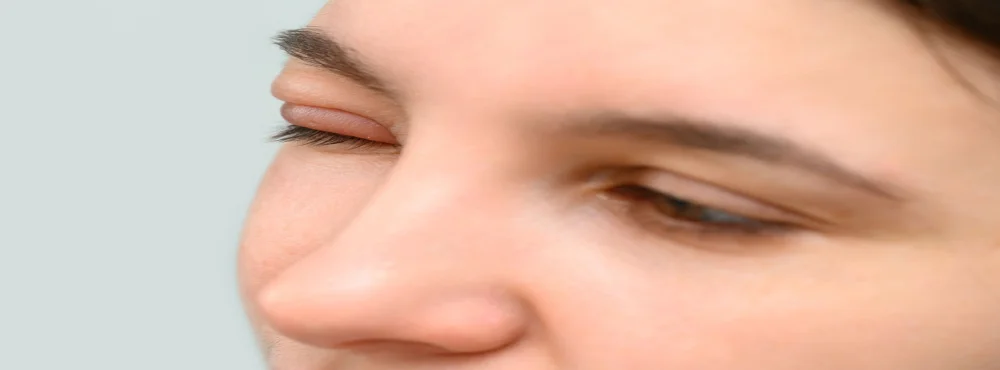Swollen eyelids occur when there is fluid retention in the tissue around the eyes or an infection, inflaming the skin and sometimes causing pain (orbital cellulitis). Various factors can cause swollen eyelids, including allergies, hay fever and eye conditions such as blepharitis, stye or chalazion.
Most issues related to swollen eyelids can be treated with at-home remedies or over-the-counter medicines. In some instances, the problem may require intensive medical attention, but this will depend on what caused the eyelids to swell.
Why is my upper eyelid swollen?
Swollen eyelids can be caused by inflammation – this can be a result of an infection, trauma, an injury or allergies. Inflammation may also be a sign of the following eye conditions:
Blepharitis
This is a chronic eye condition that can cause inflammation in both eyelids. Bacteria living on the skin is usually the main cause of Blepharitis and effects the base of the eyelashes. The result is redness, irritation and swollen eyelids.
Conjunctivitis
Also known as pink eye, conjunctivitis is an eye condition that is caused by bacterial, viral or allergic eye infections. It can cause swollen eyelids and is often accompanied by soreness, redness, mucus and crusting around the eyelashes.
Stye
A stye is caused by a blockage within the eyelid's oil gland. Bacteria can grow inside the blocked gland, causing a small lump on the eyelid. Other symptoms include swelling (and sometimes crusting) of the eyelid.
Orbital cellulitis
This is a bacterial infection that affects the soft tissue around the eye socket. Orbital cellulitis can cause both the upper and lower eyelids to swell up.
Some other conditions that can cause swollen eyelids include:
- Ocular herpes
- Thyroid conditions such as grave’s disease
- Eye allergies
- A chalazion
What is the treatment for a swollen eyelid?
Treatment for a swollen eyelid largely depends on the cause of the swelling, for example – orbital cellulitis is a serious eye condition that requires urgent medical attention, whereas a stye may be treated with home remedies.
However, it’s always best to discuss your symptoms with your optician or doctor to find the right treatment for you. You may be prescribed oral medication or eye drops.
If your doctor decides your swollen eye is not a cause for concern, you may be able to reduce the swelling by:
How can I avoid swollen eyelids?
There are some cases where swollen eyelids can be avoided. For example:
- Opting for hypoallergenic, preservative and fragrance-free cosmetic products where possible
- Regularly cleaning any make-up tools/brushes
- Patch-testing at least 24 hours before using new products
- Managing hay fever by taking medication and washing the eyes regularly
- Taking a break from contact lenses when you notice any slight swelling
- Refrain from rubbing eyes
You should also keep an eye on reoccurring reactions and note what could be causing this. As always, if symptoms persist, you should consult with your optician or doctor for medical advice.
Quick links:
Do I need an eye test?
A guide to blurry vision
A guide to dry eyes
Disclaimer: The advice in this article is for informational purposes only and does not replace medical care or an in-person check-up. Please check with an eyecare professional before purchasing any products or remedies. For information on our article review process, please refer to our Editorial Policy.

 Offers
Offers Account
Account
 Favorite
Favorite
 Basket
Basket

 OFFERS
OFFERS
















